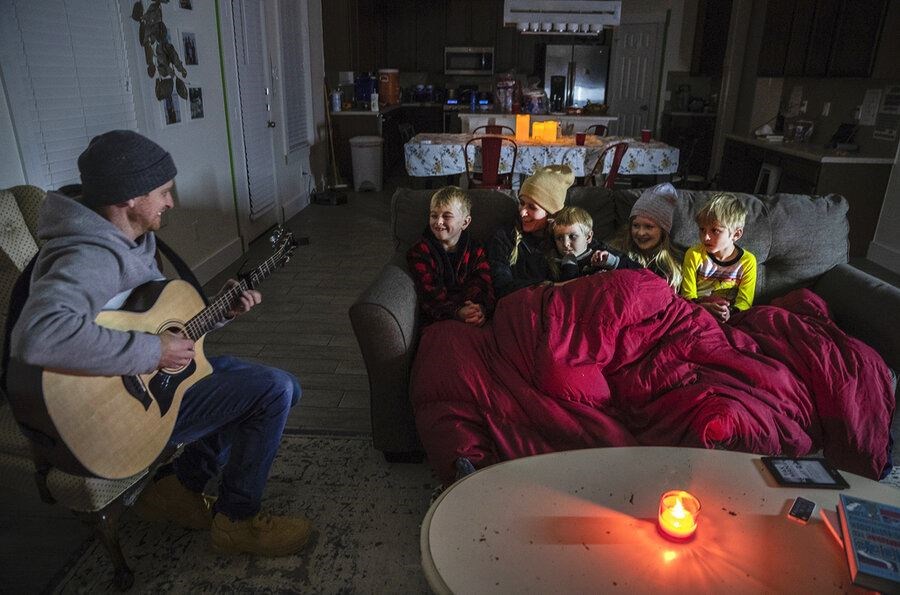REPRINTED WITH PERMISSION FROM THE CHRISTIAN SCIENCE MONITOR
The Arctic cold snap that shut down power sources has forced Texans to rethink their own role in electricity supply.
FEBRUARY 18, 2021 - TEXAS - Record cold temperatures in Texas that left millions of people without power have also sparked a heated debate over the state’s energy future. At first, the debate was merely finger-pointing. Why didn’t private utilities plan ahead for the Arctic snap? Could the state’s grid operator have demanded more electricity capacity? Did Texas rely too much on wind turbines (that froze up) or on natural gas (whose pipelines also froze)?
 Brett Archibad entertains his family as they attempt to stay warm in their home in Pflugerville, Texas, Feb. 16.AP
Brett Archibad entertains his family as they attempt to stay warm in their home in Pflugerville, Texas, Feb. 16.AP
But then the crisis turned to constructive action. Gov. Greg Abbott asked for an “emergency” review to improve the Electric Reliability Council of Texas (ERCOT), a quasi-governmental entity that manages the power grid. The Federal Energy Regulatory Commission began its own probe for solutions. Meanwhile, thousands of homeowners bought backup power units. Others searched for ways to add solar power to homes.
Many people began to discuss things they had long left to politicians and bureaucrats: energy reliability and resiliency, climate change, and, most important, how to reshape the bonds within their communities around the difficult choices over energy sources.
As Californians discovered after wildfires and heat waves knocked out power last year, Texans have entered the age of “energy democracy.” They are suddenly peeking behind the curtain of electricity governance and thinking anew how to make choices over types of energy, how to transmit it, and how much to centralize or localize power sources. They are speaking with terms like “grid participation” and “user empowerment.”
“When this is all over, we will need to have a conversation – a serious conversation – about why we are where we are today,” said Houston Mayor Sylvester Turner.
The great blackout in Texas could transform the character of its democracy. “The building of solutions to future energy needs is also the building of new forms of collective life,” wrote Timothy Mitchell of Columbia University in a 2011 book, “Carbon Democracy.”
Texas has plenty of precedents in the United States to follow. After Hurricane Katrina in 2005, New Orleans came together in new ways to revamp public education and build new types of inexpensive houses. A 2007 mega-tornado in Greensburg, Kansas, prompted a new civic unity that turned the rural town into a model for renewable energy.
Tragedies often test the affections within a community. With U.S. electric utilities set to invest about $1 trillion in the power grid by 2030, Texas could become a model for how citizens engage in reinventing their electricity sources, perhaps even bringing those supplies closer to their communities. “The value of resilience and decentralized, localized supplies of power has only grown in the public’s consciousness,” states a 2019 study by the nonprofit RMI.
The lights are back on in parts of Texas. But in addition, Texans have turned on a giant switch to see how they can make better energy choices, starting with a more democratic and caring way of making such decisions.
Page created on 2/19/2021 9:31:25 PM
Last edited 2/19/2021 9:38:33 PM
